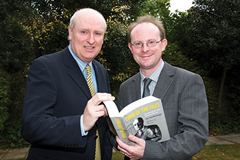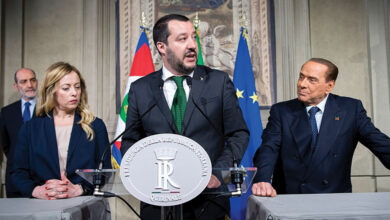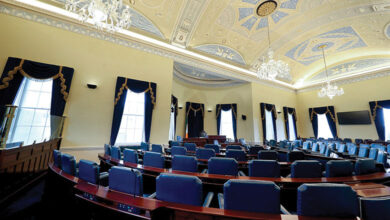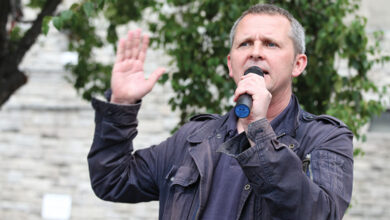Authors Michael Mulreany and Denis O’Brien
 Lord of the Files authors Michael Mulreany and Denis O’Brien explain the lessons they learned about the public servants behind historical events and the real faces of the State’s employees.
Lord of the Files authors Michael Mulreany and Denis O’Brien explain the lessons they learned about the public servants behind historical events and the real faces of the State’s employees.
In November 2011 we published Lord of the Files: an Anthology Working for the Government. The idea behind the book, conceived over 12 years earlier, was to collect in one volume, extracts from the many literary figures who have worked in the Irish public service. The original conception just kept growing. The finished product contained material not just from novels, poetry and drama but also from memoirs, biographies, archives, periodicals, magazines and newspapers.
Among the major writers we include are Flann O’Brien/Myles na Glopaleen, Hugh Leonard, Maeve Binchy, John McGahern, Eavan Boland, Paul Durcan, Joseph O’Connor, Cathal O’Searcaigh, Kevin Myers, Olivia O’Leary, TK Whitaker, FH Boland, Michael D Higgins, Seamus Heaney, Samuel Beckett and WB Yeats.
Our basic objective was to present the human face of the public sector in all its prodigal variety. To our delight we found a profusion of high quality writing – sometimes funny, sometimes dark – full of personal colour, strong characterisation and striking events.
The modus operandi was relatively simple: read everything we could, relying where possible on advice and direction from colleagues, and then reduce the mass of material into manageable themes.
We assembled material from over 300 authors ranging over almost 300 years. The authors include five Nobel Literature Prize winners, two presidents of Ireland, eight former taoisigh and members of the cabinet. The pages are also populated by a host of international statesmen: De Gaulle, Franco, Mussolini, Khrushchev, King George the Sixth, FDR and JFK. The cast includes tax collectors, customs officers, poitin distillers, smugglers, teachers, librarians, firemen, postmen, pilots, prison officers, prisoners, executioners, soldiers, ambassadors, businessmen, spin doctors, forensic scientists, crime-lords, brothel keepers, terrorists, gardaí and judges.
We have been asked repeatedly – what are the highlights in the book? This is difficult to answer because it depends on each reader’s individual response. Are they drawn to fascinating historical vignettes of people and events refracted through the prism of the public service? Or stoic responses of firemen, doctors, gardaí, bus drivers, lighthouse keepers, local authority staff and government officials who perform difficult, and dangerous, duties as part of routine work? Or quirky stories of bureaucracy and official language where the worlds of fact and fiction merge? Do they like their material comic or poignant, outraged or sombre? The compelling thing about an anthology is the accommodation of disparate events, treatments, moods and tones.
We hope, therefore, that readers will enjoy fictional correspondence about the removal of a dead dog from the door of a government department, the financial repercussions of a fracas between members of the army band at a race meeting, and the comic misunderstanding over the request for a VIP box by diminutive President Nicolas Sarkozy in advance of an Ireland-France international soccer match in Dublin in 2009. But we have included, too, the upsetting accounts of emergency services struggling to cope with horrific events, such as the German attacks on Dublin and Belfast during World War Two and the horror of the Omagh and Dublin/Monaghan bombings. There are first-hand reports of the massacre of Irish soldiers during peacekeeping operations in the Congo, attacks on police officers by paramilitaries and the maiming of civil servants by criminal gangs.
We could go on. There are stories about executioner Albert Pierrepoint crossing the Irish Sea to assist at his first execution in Mountjoy Prison, the removal by crane of a dead horse from the back garden of a house on a Dublin housing estate, difficult negotiations between the IDA and John DeLorean to bring his car manufacturing plant to Ireland, the urgent backroom preparations for President Mary Robinson’s visit to New York and encounters with selfless nurses, socially aware teachers and unyielding traffic wardens.
What impressed us greatly was the amount of lesser known writing which has the power to stimulate the modern imagination, whether about big historical events such as the Famine, word war or the birth of the Irish State or about routine events concerning form-filling or office life. We were particularly pleased to uncover previously unpublished work such as a memoir by Freddie Boland, former President of the General Assembly of the UN, and to include material from the Irish language – for example, by Máirtín Ó Cadhain – which has been translated for the first time. One of the most amusing features of the book is the range of mischievous cartoons about the public sector drawn from the now sadly defunct humorous magazine ‘Dublin Opinion’.
We structured the material into 17 themes ranging from first days at work to retirement, from daily administration to frontline danger, from interacting with politicians to working abroad, from gender issues to pay issues and from office politics to dealing with the general public.
We began the book during a boom and finished it during a recession and at a time of fundamental shifts in Irish administrative life. Against this background we are convinced of the endurance of the fundamental values of public service – accountability, integrity and impartiality. Although the public service has a somewhat grey image, we can point to example after example of humour, colour, ingenuity and inventiveness. Most of all we have learned that there are no easy stereotypes. Behind the lazy images of faceless bureaucrats and anonymous pen-pushers are the real faces of those either behind the scenes, or in the frontline of nursing, teaching or soldiering, who make our social, economic and civic life possible.
This is a time of grinding retrenchment and public servants are in the unenviable position of both administering austerity and dealing with its consequences. They are also dealing with other major issues such as greater ethnic and religious diversity, environmental degradation, resource depletion, global economic shifts and the euro crisis. At the same time staff numbers have declined. Lord of the Files shows that the public service is heir to a proud tradition of rising to such challenges and of responding with extra energy, additional hours and, most importantly, greater ingenuity.





